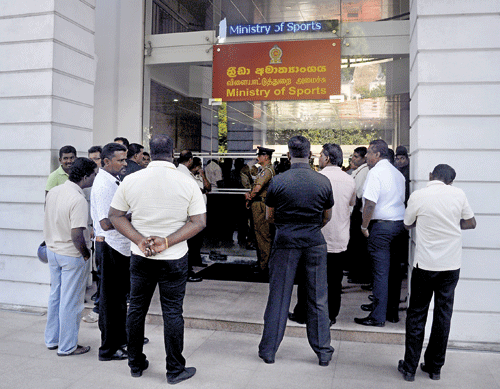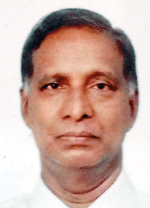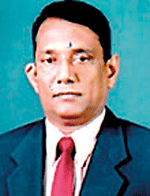Sports Minister: How could he be a useful officer!
View(s): From the time of former Sports Minister, the late V.A. Sugathadasa, the Sports Minister has been in the public eye, and sometimes, the attention he attracts is much more than a Cabinet minister. While down the line, some were effective, some were not and some were there only to mark time.  In reality, what is the role of a Sports Minister? This is what some Sports stalwarts have to say.
From the time of former Sports Minister, the late V.A. Sugathadasa, the Sports Minister has been in the public eye, and sometimes, the attention he attracts is much more than a Cabinet minister. While down the line, some were effective, some were not and some were there only to mark time.  In reality, what is the role of a Sports Minister? This is what some Sports stalwarts have to say.
 Yogananda Wijesundera
Yogananda Wijesundera
(Retired Director- Institute of Sports Science)
The Sports Ministry is an important link in any country. The Sports Ministry in Sri Lanka was established in 1966. The first Sports Minister was the late V.A. Sugathadasa. The first Secretary was Dr. H.S.R. Gunawardena. The first Director was Austin Rajakaruna, a No.1 Civil Servant. ¬†All three individuals were top sportsmen who gained National ‘colours’ in their respective Sports. They were also able to recruit some of the best sportsmen to the Sports Ministry. Among them were Lakshaman de Alwis, Sunil Jayaweera, Joe Ariyapala, Yasa Ramachandra and myself. ¬†Later, we had the services of Derwin Perera, Badra Gunawardena, Emmanuel Fernando and S.M.G. Bandara who had represented the country at the highest level. ¬†In addition, a number of top sportsmen from the Education Ministry also joined the Sports Ministry. As a result, we had a fantastic combination from the very top to the bottom, thus making it a successful administration. It was during this period that the Sugathadasa Stadium was constructed. The second Sports Minister, K.B. Ratnayake was also a top sportsman, who later turned out to be a top administrator too. He also created a National Sports Plan in 1973 and set up a Sports Fund. He then took over the National Olympic Committee (NOC) under the Sports Ministry. He pioneered the National Sports Festival (NSF) during his office. He made every effort to uplift the standard of sportsmen by sending them overseas on sports scholarships. As a result of this, the entire country realised the importance of participating in sports events.
The third Sports Minister was Vincent Perera. Although he was not a sportsman, he managed to run the ministry successfully with good administrative skills. The Race Course Ground was taken over by the Sports Ministry during his time. In addition, All National Associations came under the Sports Ministry’s supervision during his period. There were some very good administrative officials during his period, namely Lionel Madugalle (Secretary), Tory Jayawardena (Director- Sports) K.A.S. Gunasekera (Additional Secretary) and S.L. Sirisuriya (Director- Sports). ¬†Nanda Mathew was the next Sports Minister, and he was able to implement all the plans initiated by the previous Sports Ministers and the administration.
In 1991, he organised the South Asian Games (SAG) in Colombo and showcased Sri Lanka’s sporting talent to the entire region. In fact, the 1991 SAF Games was considered the best organised event in our sporting history.  As a result, a number of top sportsmen were able to come into the international arena. We were able to win the Athletic championship ahead of India for the first time.  In 1993, the Sports Ministry was able to produce top Athletes in the calibre of Sugath Tillakaratne, Damayanthi Dharsha, Susanthika Jayasinghe and Sriyani Kulawansa.  The main reason for this was the 1984 National School Games concept which was introduced by Sunil Jayaweera.  In 1994, S.B. Dissanayake took over as Sports Minister. This was probably the golden era in the sports history of Sri Lanka. We won the Football Gold Cup in Colombo in 1995. We won the Cricket World Cup in 1996. We won several medals at Asian Championships. Asian Games, World Championships, Commonwealth Games and ultimately won an Olympic Medal in 2000.
 All National Associations received sponsors to conduct their tournaments and the Sports Ministry was also shifted to a new building at Reid Avenue during this era.  But, thereafter, there was little progress in Sport with the appointments of Lakshman Kiriella, Johnston Fernando, Mangala Samaraweera, Chandrika Kumaranatunga (temporary), Jeevan Kumaranatunga, C. B. Ratnayake, Mahindananda Aluthgamage, Navin Dissanayake and Dayasiri Jayasekera.  Today, we do not see any top sportsmen serving in the Sports Ministry, and those who were serving earlier are now retired.  At the moment, we have unqualified officials occupying top positions in the Sports Ministry, and they have no idea of any Sports events in the country.
All National Associations received sponsors to conduct their tournaments and the Sports Ministry was also shifted to a new building at Reid Avenue during this era.  But, thereafter, there was little progress in Sport with the appointments of Lakshman Kiriella, Johnston Fernando, Mangala Samaraweera, Chandrika Kumaranatunga (temporary), Jeevan Kumaranatunga, C. B. Ratnayake, Mahindananda Aluthgamage, Navin Dissanayake and Dayasiri Jayasekera.  Today, we do not see any top sportsmen serving in the Sports Ministry, and those who were serving earlier are now retired.  At the moment, we have unqualified officials occupying top positions in the Sports Ministry, and they have no idea of any Sports events in the country.
This is well exhibited with the recent questions posed by some of the top officials of the Sports Ministry. One of the officials had queried as to how many rounds does the 100 metres race include. Another official had wondered how we could win a Beach Volleyball game with only two players. This is a very sad situation in the Sports Ministry. All Sports Ministers who came to power in the recent past had their part of controversy with the Sports Law, Cricket Board and the NOC. They had done nothing to develop Sports in this country.  The only good thing they do is organise the NSF from January to October, spending over Rs. 6 billion for it, but its impact is low. The Sugathadasa Stadium and the Mahinda Rajapaksa Stadium have been closed down for repairs.
 N.D. Gunasena (Retired Sports Officer)
N.D. Gunasena (Retired Sports Officer)
Firstly, we should know the purpose of establishing a Sports Ministry. We can trace the origin of the Sports Ministry through the Sports Act. The Sports Ministry was established by Sports Act No. 23 of 1973. Sports Ministry regulates the National Sports Council (NSC), District Sports Committee (DSC), NOC, Registration of National Sports Associations (NSA) and regulating them, and administering and managing Sports funds, etc.  The service of the NSC officials is not visible, impacted and felt. The NSC is not interacting with NSAs in an active manner. Formulating necessary policies for the promotion of Sports and advising the Sports Minister, are the main duties of the NSC. We have to think twice whether they are doing that. The duty of the Sports Minister is to appoint active Members to the NSC.  We have the greatest doubt whether the DSC has been established to promote, manage and administer Sports. In Administering the DSC, the best exemplary institution is the Australian Institute of Sports (AIS). AIS has established its branches in all important Australian cities. They select potential youth with the suitable Age limit, provide them with Skills & Technique, Fundamentals, Sports Equipment and tools, in addition to providing Training Facilities and proper Nutrition etc are some of AIS activities. Sportsmen/women are identified at age 14, and are motivated and developed. AIS is a model for promoting and developing Sports in Sri Lanka. DSCs should penetrate at grassroot level to develop Sports in Sri Lanka.
Director General of Sports should supervise the NSAs, particularly, whether they are meeting regularly and are administering and managing its funds properly.  When you talk about the Sports fund, the main issue is whether the funds are equally distributed to all NSAs. The major duty of the Sports Ministry presently, is to provide funds for teams to travel abroad. Hence, all NSAs repeatedly request for fund for foreign trips.  What they do not do is not give focused attention for the development of Sports. The NSAs are not keen to develop the required facilities. They are backward in providing nutritional foods, conducting training camps and seminars for the development of Sports, while the NSAs’ main function now is requesting funds to go abroad.  The Sports Ministry representatives should look into the weak areas in the management of Sports. Otherwise, Sports Activities will nosedive.  There is no point in talking about National Olympic Committee, Sports Ministry should take action, to award sports degrees to those who are studying and undergoing training in the National Sports Institutions.  Sports officers attached to the Sports Ministry are always looking for foreign trips through NSAs utilising its funds.
The Director General of Sports and the supervising officers of the relevant NSAs should look into whether they are conducting training camps and identifying sports talents. ¬†Sports officers should not stand for election to the NSAs. Only the Minister’s representatives should be appointed to the NSAs. ¬†We are taking about the 2020 Olympics, the SAG, etc. We are not talking about the Youth Olympic Games to be held in Argentina in 2018. There are two more years. We can get Youth Olympic Medals, if talented Sportsmen/women are selected and given proper training from now onwards. ¬†There are no Sports Calendars prepared by the Sports Ministry. A good example is a clash of dates of two Sports event on the same day, i.e. the Colombo Marathon and the NSF. There should be a National Sports Calendar Committee comprising experts to prepare a National Sports Calendar. ¬†The Sports Minister announced that each District will have a Swimming Pool. It is a good thing. ¬†It should also be mentioned here that the Sports Hotel at Sugathadasa Stadium, established by the late President Ranasinghe Premadasa, is relegated to a Restaurant. It should be upgraded to the level of a Sports Hotel to provide hotel facilities to Sportsmen/women.
 K.A.S. Gunasekera (Retired Secretary- Ministry of Sports)
K.A.S. Gunasekera (Retired Secretary- Ministry of Sports)
I have served in 7 government ministries as the Secretary, and the only person to have served in so many ministries. I am not a National sportsman, although I had worked a long period as Secretary of the Sports Ministry. I was involved in Sports activities during my school days. As I am not a sportsman in the highest calibre, I use to get advice from senior and veteran sportsmen. Even though I listen to my colleagues during some decision-making, I finally make up my mind and make the decisions. I always think twice before making a decision. All those former officials from top to bottom in the Sports Ministry worked hard for the betterment of Sports. Of the former officials, I can say that the late Lakshman de Alwis was one of the finest. He was one person who spoke the truth on behalf of the Sport. It is sad that the current set of officials are completely ignorant and are not even aware of some of the basic rules and regulations governing Sports. I was Chairman of the Investigation Committee appointed by the then Sports Minister, to probe Sri Lanka’s dismal performance at the 2010 Asian Games in China.  I prepared the document which highlighted the setbacks at the Games and the manner in which Sri Lanka should progress thereafter. But, it was sad that I could not find a person to get the document typed. The former officials of the Sports Ministry put their heart and soul for the development of the Sports in this country.
They always worked honestly without any personal gains. I can remember former Sports Minister Vincent Perera, when he accompanied me to a sports goods shop to purchase a pair of shoes. I asked him why did he bought a pair of shoes for him. He responded by requesting me to accompany him to Galle. We left immediately for Galle and went to the residence of up and coming Athlete Dhammika Manike.  That time there were several newspaper reports that Manike had won many events running barefooted. The Minister gifted the pair of shoes to Manike and also donated some funds for her house renovation. Today, we can see some of the ministers looking for cheap publicity. I can also remember Minister Vincent Perera warning me not to divulge this incident to anyone. I suggested conducting a Sports Workshop with the collaboration of the National Sports Associations (NSA), National Athletes and coaches. The then Sports Minister welcomed the proposal but could not make it a reality. We were very strict in discipline regarding the Sports Associations. The former NOC officials could not even get close to the former Director- Sports, Nelum Gunasekera who was a strict official. We implemented all financial laws to the betterment of the Sport. I can remember a president of a NSA presenting an unauthorised receipt which was later rejected by the Sports Ministry. I got a 6-month scholarship from Germany to follow a Sports Administration Course. I refused the offer and allowed two other Sports officials to follow the Course. Unlike today, we did not have a mania for foreign tours. The former officials always led from the front and were an example to the rest.
 Asoka Goonathilake
Asoka Goonathilake
(Veteran Sports Journalist)
Ever since the introduction of the Sports Law, No 25 of 1973, Sports Sri Lanka has changed hands 12 times and now rests in the hands of incumbent, Dayasiri Jayasekera. They had 12 different agendas in governance. Some of them were instrumental and were in the forefront for glorious victories, while others ended up in disgrace.  Sports in Sri Lanka has gone through different eras, whether in memorable victories or shameful defeats, and are now looking forward to yet another era, the 13th, under present Minister of Sports, Dayasiri Jayasekera, for better or for worse.  The bond between Sports and politics in Sri Lanka proper was conceived in 1976, when the country’s brightest medal prospect for the Montreal Olympic Games, S.L.B. Rosa was barred from representing the country, but instead, allowing an official to go to Montreal as an observer.  Thus, Sri Lanka became part of an international political campaign to boycott the Games, initiated by the Africans.  Most of the victories of Sports Sri Lanka registered in the past were due to the untiring efforts made by gentleman coaches such as the late Lakshman De Alwis, A.J. Rodrigo (Snr), Sunil Jayaweera, Sunil Gunawardene, Yogananda Wijesundera and Dervin Perera to name a few. They had their initial sports training in places such as the Leipzig Sports University in Germany and elsewhere. This was due to the love affair Ron Wonderlaag of the German Overseas Sports Aid Programme had with the then Sri Lankan sportsmen who ran like the present Ethiopians or Jamaicans.
Some of their coaches could be seen even today at coaching venues.  Most of such foreign assistance came through the cultural exchange programmes between the Government of Sri Lanka and other governments.  Sports Sri Lankas governance moved into a palatial building recently, thus, unfortunately, making it more of a political meeting place than a Sports Ministry.  Officers from top to bottom were seen engaged in Sports politics to get their favourites elected to NSAs, but hardly paying concentrated attention to their assigned duties.
Once the Ministry of Sports itself got involved in the historical bout with the NOC, and that went up to the International Olympic Committee (IOC), who later warned both parties, ‚ÄėGive up your politics or face suspension‚ÄĚ. This warning is still in force! ¬†This undue confrontation was a matter for the local decision-makers which eventually, and unnecessarily, reached the Boardrooms of the IOC, further confirming there is political interference in the country‚Äôs Sports administration. ¬†However, the Ministry of Sports is still looked at as a money throwing and travel approving institution for those who go abroad for competitions and studies, whereas, there is an enacted paragraph in the constitutions of every NSA that, they should find the finances. This is the bane of most NSAs, not only in Sri Lanka, but all over South Asia. India may be an exception.
Had the promise made on September 12, 1982, in Matale, by late President J.R. Jayewardene who was the Chief Guest of the Sports Festival of that year, to establish a Sports University in Sri Lanka, materialised, (without a Faculty of Politics!) as promised, things could have gone for better…or even bitter.  The Sports Ministry is the closest ministry to the general public. People want a dynamic boss at the top, with well educated Sports administrators around him. Abundant facilities at his fingertips etc, and not spending thumping amounts of public money on colourful, fruitless festivals  The Sports Ministry utilised a huge amount of funds, in a desperate attempt to host the Commonwealth Games in Hambantota in 2018.  We could have easily utilized these funds for the betterment and development of Sports events in the country.


